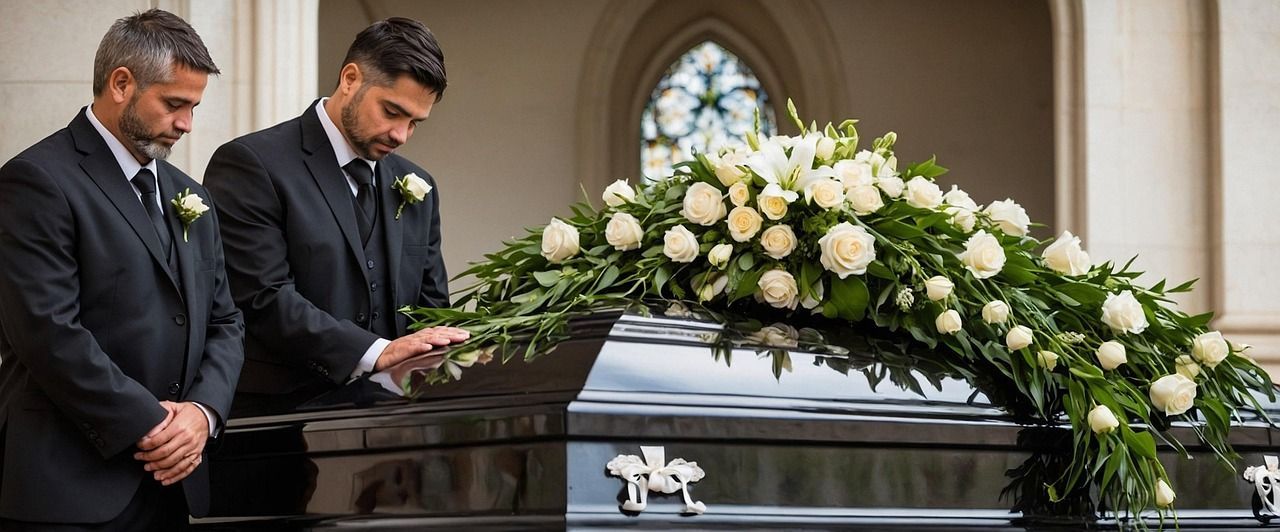July 9, 2025
When planning a funeral, keep in mind that various factors influence costs, such as economic and cultural aspects, personal preferences, and location. Funeral homes offer services like casket selection, memorial planning, and transportation assistance, providing support during a tough time. Understanding the breakdown of expenses, including service fees, casket options, and transportation costs, is vital. Additional costs like tributes, flowers, cemetery fees, and obituaries should be considered. Preplanning and prepayment options can help ease financial burdens, while community resources and financial aid programs offer support. Prioritize key financial decisions and explore savings options to effectively manage funeral expenses. Key Takeaways - Funeral costs include service fees, caskets, transportation, and more. - Planning is essential to manage expenses effectively. - Consider preplanning options for financial relief. - Savings accounts and insurance can help cover costs. - Community support and aid programs are available. Factors Affecting Funeral Costs When planning a funeral, it's important to understand the various factors that can influence the overall costs involved in the process. The cost variability in funerals can be significant, affected by economic factors, cultural influences, personal preferences, and the impact of location. Economic factors play a significant role in determining funeral costs. The state of the economy, inflation rates, and local market prices for services and products can all impact the final expenses. Understanding these economic influences can help you navigate the financial aspects of planning a funeral more effectively. Cultural influences also play a significant role in determining funeral costs. Different cultures have varying traditions and expectations when it comes to funerals, which can affect the overall expenses. Being aware of these cultural norms can help you plan a funeral that respects and honors your loved one while staying within your budget. Personal preferences, such as the choice of casket, type of service, and additional memorial items, can also impact the total cost of a funeral. It's important to consider these preferences carefully to create a meaningful service while staying mindful of the associated expenses. Moreover, the location where the funeral takes place can have a considerable impact on the overall costs. Urban areas tend to have higher prices for funeral services compared to rural areas due to differences in overhead costs and demand. Understanding how location influences costs can help you make informed decisions when planning a funeral. Services Offered by Funeral Homes Understanding the factors influencing funeral costs can help you navigate the range of services offered by funeral homes with clarity and confidence. When considering funeral arrangements, funeral homes provide a variety of services to support you during this challenging time. Here are some crucial services you can expect: - Service Options: Funeral homes offer different service packages to meet your specific needs, whether you prefer a traditional funeral service, a memorial ceremony, or a celebration of life. - Casket Selection: Funeral homes typically have a selection of caskets available for you to choose from, ranging in materials, designs, and price points to accommodate your preferences and budget. - Memorial Planning: Funeral homes can assist you in planning and organizing a meaningful memorial for your loved one, including coordinating flower arrangements, music, and personalized touches. - Transportation Services: Funeral homes often provide transportation services for the deceased, as well as for family members and guests attending the services, ensuring a smooth and respectful passage to the final resting place. Breakdown of Funeral Expenses To gain a better understanding of the costs associated with funerals, let's explore a detailed breakdown of funeral expenses. When planning funeral arrangements, it's crucial to take into account the pricing breakdown to make sure you are financially prepared. Here is a breakdown of common funeral expenses to assist you in your financial planning and budgeting tips: - Service Fees: Professional services of the funeral home, staff, and facilities. Cost considerations: These fees cover the overall coordination and support during the funeral process. - Casket or Urn: The container for the deceased. Cost considerations: Consider various options based on preferences and budget constraints. - Transportation: Hearse, limousine, or other vehicles. Cost considerations: Factor in the distance and logistics for transportation needs. Understanding these cost considerations can help in creating a suitable financial plan for the funeral. By carefully budgeting and evaluating the pricing breakdown, you can make sure that you are making informed decisions that align with your financial capabilities. Planning ahead and being aware of these expenses can help alleviate some of the financial burdens during this challenging time. Additional Costs to Consider Consider these vital additional costs when planning a funeral to guarantee thorough financial preparation. - Memorial tributes: Personalized items or services to honor the memory of your loved one. - Floral arrangements: Flowers for the service and gravesite, which can vary in cost depending on preferences. - Cemetery fees: Charges for the plot, interment, and any additional services provided by the cemetery. - Obituary costs: Expenses related to publishing an obituary in newspapers or online platforms. - Transportation expenses: Costs for transporting the deceased, family, and guests to and from the funeral service or cemetery. These extra expenses can often catch families off guard, underscoring the importance of thorough planning. By understanding and accounting for these costs upfront, you can better manage your budget and ensure that your loved one receives a fitting farewell. Be sure to inquire about any potential additional fees that may arise based on specific requests or services, as transparency in pricing is essential during this emotional time. Planning ahead and discussing these expenses with your funeral director can help alleviate financial stress and allow you to focus on honoring your loved one's memory in a meaningful way. Preplanning and Prepayment Options When preparing for a funeral, exploring preplanning and prepayment options can provide peace of mind and alleviate future financial burdens. Budgeting strategies play an important role in ensuring that your funeral arrangements align with your financial capabilities. By engaging in financial planning for end-of-life expenses, you can make informed decisions about payment options and potentially lessen the financial strain on your loved ones. Consider setting up a savings account specifically designated for funeral expenses. This proactive approach allows you to gradually accumulate funds for future needs, ensuring that you have the necessary resources available when the time comes. Additionally, advance directives can help outline your preferences for your funeral arrangements and associated costs, giving you control over how your financial resources are utilized. When it comes to prepayment options, some individuals choose to cover their funeral costs in advance. This method can offer peace of mind, sparing your family the financial burden during an already challenging time. Before opting for prepayment, make sure you understand the terms and conditions of the agreement to make an informed decision that aligns with your wishes and financial situation. Understanding Payment Assistance Programs Explore available financial support programs that can help alleviate the burden of funeral costs during difficult times. When facing the financial challenges of arranging a funeral, understanding payment assistance programs can provide much-needed relief. Here are key points to keep in mind: - Eligibility criteria: Payment assistance programs often have specific eligibility requirements based on income levels, location, or other factors. Make sure to review these criteria to determine if you qualify for support. - Application process: Understanding how to apply for payment assistance is essential. Familiarize yourself with the application process, including any documents or information required for submission. - Financial documentation: Be prepared to provide financial documentation as part of the application process. This may include proof of income, assets, or expenses to demonstrate your need for assistance. - Support services: Payment assistance programs may offer additional support services beyond financial aid. These services could include counseling, guidance on funeral planning, or referrals to other resources. - Community resources: In addition to formal payment assistance programs, there may be community resources available to help with funeral costs. Explore local organizations, religious institutions, or charitable foundations that offer support during challenging times. Tips for Managing Funeral Expenses To effectively manage funeral expenses, it's vital to prioritize key financial decisions that can help alleviate the burden during this challenging time. When facing the financial implications of a funeral, implementing budgeting strategies is important. Start by outlining all potential costs and creating a detailed budget to make sure you have a clear understanding of your financial obligations. Consider exploring savings options to help cover funeral expenses. Setting aside a portion of your income regularly or using existing savings can ease the financial strain. Moreover, review your insurance coverage to see if any policies may assist in paying for funeral costs. Seeking community support can also be advantageous. Friends, family, or local organizations may offer assistance or guidance during this difficult period. Don't hesitate to reach out and share your situation to see what support is available. In cases where financial assistance is needed, inquire about potential aid programs or resources that can help manage funeral expenses. Various organizations provide support to individuals facing financial difficulties related to funerals. Remember, you aren't alone, and there are avenues to explore for assistance during this challenging time. Frequently Asked Questions How Can I Personalize the Funeral Service? To personalize the funeral service, consider personalized tributes, customized ceremonies, unique memorials, special touches, and personalized keepsakes. Add elements that reflect the individual's life, passions, and personality, creating a meaningful and memorable farewell. Are There Eco-Friendly Burial Options Available? When considering eco-friendly burial options, you have choices like green burials, sustainable options, biodegradable caskets, environmentally friendly funerals, and eco-conscious memorials. These choices honor both your loved one and the environment. Can I Use Life Insurance to Cover Funeral Costs? You can use life insurance to cover funeral costs. The policy typically provides a payout that can help with burial expenses, cremation costs, and memorial services. It's a way to plan ahead and ease the financial burden. What Is the Etiquette for Funeral Donations? When it comes to funeral donations, proper etiquette involves considering donation options like memorial funds, funeral flowers, and sending thank you notes. Expressing gratitude for the support shown during this difficult time is crucial. Are There Virtual Funeral Options for Distant Family? When dealing with the distance, virtual memorials, online ceremonies, remote viewing, digital guestbooks, and live streamed funerals can offer solace. These options connect you with loved ones during a challenging time, providing comfort and support. Conclusion As you navigate the complexities of planning a funeral, remember that understanding the costs involved is like shining a light in the darkness. By breaking down the expenses and exploring your options, you can create a meaningful and respectful tribute to your loved one. Stay informed, stay strong, and know that you're never alone in this process. Together, we can navigate the intricacies of funeral planning with clarity and compassion.



















